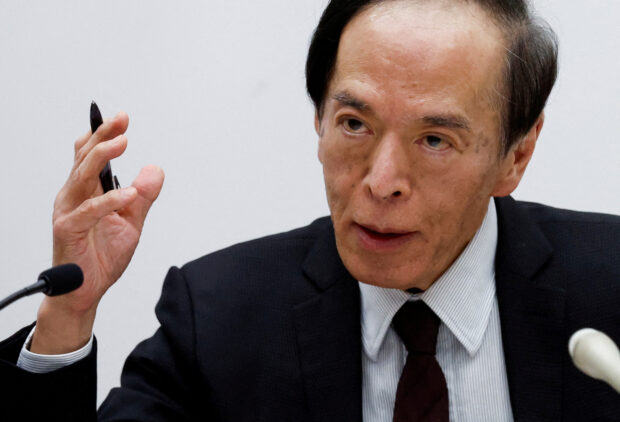
Bank of Japan Governor Kazuo Ueda attends a press conference after their policy meeting at BOJ headquarters in Tokyo, Japan Dec 19, 2023. REUTERS/Issei Kato/File photo
TOKYO -The Bank of Japan maintained ultra-easy monetary settings on Tuesday in a widely expected move, as policymakers allow more time to determine whether wage increases will broaden enough to keep inflation sustainably at its 2-percent target.
However, underlining its growing conviction that conditions for phasing out its massive stimulus was falling into place, the central bank said the likelihood of the economy achieving durable 2 percent inflation continued to “gradually rise”.
Traders are focusing on any clues by Governor Kazuo Ueda on how soon the BOJ will pull short-term rates out of negative territory, which is seen as the next move Ueda will take in dismantling his predecessor’s radical stimulus program.
READ: Softening consumption may delay BOJ’s exit from easy policy
Many market players expect the BOJ to end negative rates sometime this year with a recent Reuters poll showing April as the most likely timing for this to occur.
“The BOJ decided to stand pat probably because it wanted more evidence a virtuous cycle of wage growth and prices will take hold,” said Izuru Kato, chief economist at Totan Research, adding that he expects the bank to end negative rates in April.
Consumer inflation forecast
At the two-day meeting that concluded on Tuesday, the BOJ left unchanged its short-term rate target at -0.1 percent and that for the 10-year bond yield around 0 percent. The central bank has maintained negative interest rates since 2016.
The yen fell broadly after the announcement, last trading at 148.39 per dollar..
In a quarterly report on the outlook, the BOJ cut its core consumer inflation forecast for the fiscal year beginning in April to 2.4 percent from 2.8 percent projected in October.
It slightly revised up its forecast for fiscal 2025 to 1.8 percent from 1.7 percent.
The board left unchanged its forecast that an index gauging trend inflation will hit 1.9 percent in 2024 and 2025, underscoring policymakers’ view the economy is on track for sustainably meeting 2 percent inflation.
READ: Japan core inflation slows for second month, takes pressure off BOJ
“Consumer inflation is likely to increase gradually toward the BOJ’s target as the output gap turns positive, and as medium- to long-term inflation expectations and wage growth heighten,” the BOJ said in the outlook report.
“The likelihood of realizing this outlook has continued to gradually rise, although there remain high uncertainties over future developments,” the report said in a newly added phrase on prospects for hitting its price target.
The BOJ’s meeting precedes that of the European Central Bank on Thursday and the U.S. Federal Reserve next week, both of which aggressively tightened monetary policy last year and are now contemplating cutting interest rates ahead.
Japan has seen inflation exceed the BOJ’s target for well over a year. But Ueda has stressed the need to hold off on raising rates until there is more evidence that inflation will durably stay around 2 percent, accompanied by solid wage growth.
Wage hike expectations
The BOJ’s caution reflects Japan’s 25-year history of deflation that had undermined wage growth, and prodded the central bank to keep ramping up stimulus. The last time Japan saw an interest rate hike was in 2007, a move that was later criticized by politicians as premature.
Surveys and comments from business lobbies have shown an increasing chance Japan’s spring wage hikes will be above last year’s 30-year high 3.58 percent for major firms – a key prerequisite set by the BOJ for exiting ultra-loose monetary policy.
READ: BOJ’s Ueda keeps wage hike hopes, quake dampens bet of Jan policy shift
But the chance of success in meeting another prerequisite, which is a steady rise in services prices, remains uncertain.
While services prices have crept up, the increases are concentrated on sectors benefiting from a rebound in inbound tourism or where labor shortages are acute.
Markets are focusing on whether Ueda will sound more optimistic about prospects for wages to keep rising in tandem with inflation at his post-meeting briefing, which would signal an increasing chance of an end to negative rates in March or April. The governor will hold a press conference at 0630 GMT.